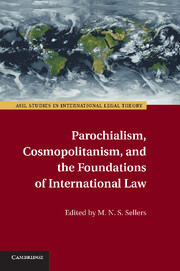Book contents
- Frontmatter
- Contents
- Notes on Contributors
- Preface
- 1 Introduction
- 2 Parochialism and the Legitimacy of International Law
- 3 Parochialism, Cosmopolitanism, and the Paradigms of International Law
- 4 Liberal Cosmopolitanism or Cosmopolitan Liberalism?
- 5 Are Human Rights Parochial?
- 6 The Parochial Foundations of Cosmopolitan Rights
- 7 Rights in Reverse
- 8 Parochial Restraints on Religious Liberty
- 9 Parochialism, Cosmopolitanism, and Justice
- Index
- References
2 - Parochialism and the Legitimacy of International Law
Published online by Cambridge University Press: 05 December 2011
- Frontmatter
- Contents
- Notes on Contributors
- Preface
- 1 Introduction
- 2 Parochialism and the Legitimacy of International Law
- 3 Parochialism, Cosmopolitanism, and the Paradigms of International Law
- 4 Liberal Cosmopolitanism or Cosmopolitan Liberalism?
- 5 Are Human Rights Parochial?
- 6 The Parochial Foundations of Cosmopolitan Rights
- 7 Rights in Reverse
- 8 Parochial Restraints on Religious Liberty
- 9 Parochialism, Cosmopolitanism, and Justice
- Index
- References
Summary
Contemporary international law – including its institutional agents and mouthpieces, such as the United Nations, World Trade Organization, and International Court of Justice – asserts the “legitimacy” of its claim to govern an increasingly broad, diverse, and consequential array of activities within the global domain. However, this very domain manifests high levels of divergence in the cultural norms; patterns of economic and legal organization; religious, moral, and political creeds; and so on that are prevalent within and across its constituent states. In light of these deep and ramifying differences, how can international legal norms and institutions avoid reflecting a partial or “parochial” perspective, with the result that their “legitimacy” is seriously imperiled? This chapter explores this rather vague, but prima facie genuinely disquieting, line of thought by considering two distinct, but readily confused, ways in which “parochialism” might undermine the legitimacy of international law. The first sees the challenge as arising from meta-ethical skepticism about ethical values in general; the second, by contrast, treats it as the upshot of the ethical doctrine of pluralism. The conclusion toward which this chapter steers is that skepticism, although more radically subversive in its implications for the legitimacy of international law, is not a promising way of articulating the anxiety about parochialism. By contrast, the less-frequently examined pluralist challenge poses a significant constraint on international law's legitimacy, albeit one that still leaves plenty of room for the legitimacy of a robust international legal order.
What Is Legitimacy?
What is “legitimacy”? According to a recent book-length study, the language of “legitimacy” has become “dominant and recurrent” in contemporary international relations, upstaging the language of legality, justice, and efficiency. Perhaps somewhat cynically, one might suppose that its dominance at the level of international political rhetoric is not unconnected with its indeterminacy of sense, or at least with the lack of widespread agreement among international law practitioners on an univocal concept of legitimacy. Even if it is true that, as the author of the aforementioned study goes on to suggest, the concept remains “widely ignored in the academic discipline of international relations,” the same cannot be said of contemporary legal and political philosophy, in which legitimacy has been the focus of sustained discussion by a number of influential writers. Without yet immersing ourselves in the intricacies of this work, there are two philosophical commonplaces about legitimacy that should orient our discussion from the outset.
- Type
- Chapter
- Information
- Publisher: Cambridge University PressPrint publication year: 2011
References
- 19
- Cited by



